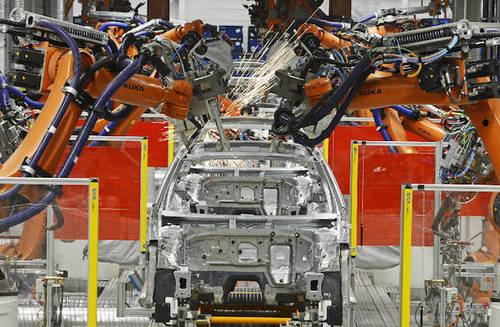


08/25/2015
Above, robots build Volkswagens in a German factory.This report from Down Under probably describes the situation in all first-world societies: colleges and trade schools are cranking out increasingly useless degrees and skills that will not serve the economic interests of those who work for years to get them. The workplace is undergoing fundamental change because of automation, robotics and computers, but hidebound elites in government and education behave as if it’s the same old job market.
While American young people face record college costs, their efforts sometimes don’t bring hiring, even though the economy is supposed to be improved. Graduates with bachelor’s degrees faced an unemployment level of 14.9 percent last year.
Curiously, most of the news stories about unemployed college grads leave out details of what majors the jobless young people had. A major in art history or ethnic studies may have been interesting to certain people, but they are economically useless.
My suggestion for education relevance is that useful majors should cost less in tuition. Anyone dedicating his academic life to chicano studies should have to pay more for it.
Another suggestion: prune immigration severely. Humans are becoming obsolete in many workplaces, from the factory to the farm.
N.b. TAFE in the following article stands for Technical and Further Education. Apparently Aussie vocational schools are not facing workplace changes any better than academic institutions.
More than half of students chasing dying careers, report warns, ABC News Australia, August 24, 2015
Sixty per cent of Australian students are training for jobs that will not exist in the future or will be transformed by automation, according to a new report by the Foundation for Young Australians.
The not-for-profit group, which works with young Australians to create social change, says the national curriculum is stuck in the past and digital literacy, in particular, needs to be boosted.
Foundation chief executive Jan Owen says young people are not prepared for a working life that could include five career changes and an average of 17 different jobs.
She says today’s students will be affected by three key economic drivers: automation, globalisation and collaboration.
“Many jobs and careers are disappearing because of automation,” Ms Owen said.
“The second driver is globalisation — a lot of different jobs that we’re importing and exporting.
“And then thirdly collaboration which is all about this new sharing economy.”
After early career ambitions which included being a lawyer “like Ally McBeal”, a pathologist and and a pharmacist, Jillian Kenny is now the co-founder of a program that inspires young women to take up engineering.
She says an alarming amount of university and TAFE students are studying in the wrong areas.
“Nearly 60 per cent [of students] at university and nearly 70 per cent at TAFE were studying jobs that will be automated,” Ms Kenny said.
“So that’s 44 per cent of jobs that will be automated in the next 10 years.”
The Foundation’s Ms Owen said students should be gearing themselves towards jobs that will open up in the future, including in the health care and aged care sectors.
She said job opportunities in the digital economy and the green economy would also continue to evolve.
“The point is that young people need to be prepared for those jobs, with 50 per cent needing digital capability.”
She is also calling for Australia to adopt a national enterprise learning strategy.
“This is a conversation that everyone needs to have,” she said.